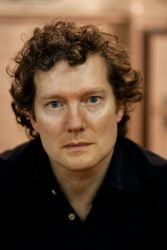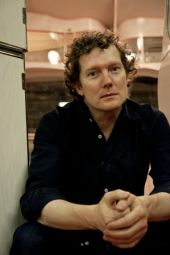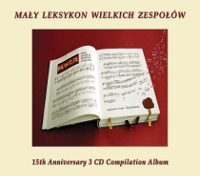 Tim Bowness is a British singer, songwriter, musician and co-owner of the independent music label Burning Shed. His career spanning across three decades now, he has left a mark in versatile genres of contemporary music, releasing solo albums and co-writing and producing recordings with other musicians from across the world. He may be best known to our readers for his long-running musical collaboration with progressive rock legend Steven Wilson (Porcupine Tree, Blackfield). The duo, referring to themselves as No-Man, has been releasing widely acclaimed albums of experimental music since 1987, which can boast some of the most daring experimentation in the recent music history, while essentially being very approachable popular music. Being a massive fan of Tim’s uniquely blended songwriting ability, inimitable vocal approach, charismatic on-stage performances and lyrical subtlety, I couldn’t help asking him to do an interview that will hopefully serve to introduce him to a wider Polish fan base.
Tim Bowness is a British singer, songwriter, musician and co-owner of the independent music label Burning Shed. His career spanning across three decades now, he has left a mark in versatile genres of contemporary music, releasing solo albums and co-writing and producing recordings with other musicians from across the world. He may be best known to our readers for his long-running musical collaboration with progressive rock legend Steven Wilson (Porcupine Tree, Blackfield). The duo, referring to themselves as No-Man, has been releasing widely acclaimed albums of experimental music since 1987, which can boast some of the most daring experimentation in the recent music history, while essentially being very approachable popular music. Being a massive fan of Tim’s uniquely blended songwriting ability, inimitable vocal approach, charismatic on-stage performances and lyrical subtlety, I couldn’t help asking him to do an interview that will hopefully serve to introduce him to a wider Polish fan base.
DO: Please introduce yourself to our readers.
TB: I’m Tim Bowness from the bands No-Man, Slow Electric, Memories Of Machines (and others). I also co-run the music company Burning Shed.
DO: You are most readily associated with the long-running project No-Man involving Steven Wilson of Porcupine Tree fame. Could you recall for us what brought the two of you together and what your working principles are?
TB: Steven saw a couple of reviews of a band I was in (called After The Stranger) and approached me to contribute a track to a compilation album he was putting together.
By the time the album was finally taking shape, I was in another band (called Plenty) and I’d also struck up a phone friendship with Steven. We both had diverse tastes, a curiosity about music, and a desire to do something unlike anything we’d done before, so inevitably, we discussed making some music together.
I travelled from the North of England to the South in the Summer of 1987 to see what we’d come up with. Within the first couple of hours, we wrote two wildly different songs. One, called Screaming Head Eternal, was a chaotic piece of Indie Punk Jazz noise, while the other, Faith’s Last Doubt, was an epic 8 minute ballad with some interesting use of texture and unusual musical changes. The extremes of the band’s parameters were set early!
DO: I remember a journalist dubbing you and Steven “sorrowful sonic architects” in an old article about No-Man. I feel this self-coined term describes the No-Man music very accurately. Do you like the formulation?
TB: It’s a very evocative phrase and it certainly fits the majority of the band’s output. I’ve always felt the band’s music was melancholy, but also uplifting in some way. I don’t think of it as desolate, anyway.
DO: I’m a long-time aficionado of not only your music and singing style, but, equally, of your bittersweet lyrics. To me they are an essential component of your creative output due to your unique ability to pinpoint emotions without much verbosity (unlike the intricacy of, say, Peter Sinfield’s poems). How did you come to work out this style of yours? Who where your influences? And as there is some bitter humour to be found in them, what do your lyrics have in common with the notorious subdued English humour?
TB: I’ve always been drawn to writers who seem to say a lot while using few words, so Harold Pinter, Raymond Carver, Kurt Vonnegut, Jean Rhys and Samuel Beckett appeal to me. I also like Philip Larkin, TS Eliot, and the Mersey Poets of the 1960s (Roger McGough and Brian Patten).
As for my lyrical style, I’d say it’s something that’s evolved as a result of a combination of influences/taste, experience/background, limitations and my own personality.
With humour, it depends on what I’m writing for. I think my lyrics on Dry Cleaning Ray, Wild Opera and for Centrozoon definitely have a sense of playfulness about them (that the music encouraged). Not to compare myself with the following, but on the rare occasions I do ‘funny’, there’s a sarcasm in the work, which I think echoes fellow North West English artists such as Morrissey, 10cc, and John Lennon.
DO: Drawing the line with No-Man, what should the quintessential No-Man song contain, ideally, in terms of sensations rendered as well as on the composer’s side?
TB: For me, Things I Want To Tell You is a really good representation of No-Man’s more melancholy side. I’d like to think it’s ambitious and epic, while also being understated, and quite emotionally detailed, while being lyrically very simple.
DO: You are known for numerous collaborations where you contribute mostly in terms of singing and songwriting. Amongst these one counts your work with Peter Chilvers,German dark experimental band Centrozoon, ex-Fairport Convention singer Judy Dyble, Nosound’s Giancarlo Erra to name just a few. How do you choose who to work with?
TB: In some cases, I’ve been approached (Judy Dyble, OSI, Markus Reuter and Giancarlo Erra, for example), in others I’ve approached people (Phil Manzanera, Richard Barbieri etc), and elsewhere it’s just emerged out of a friendship (Stephen Bennett, Peter Chilvers, Alistair Murphy and so on). In all the examples chosen, it’s seemed that there’s been enough common ground for us to work from.
I look for things that either challenge me or bring out the best in what I do naturally.
I recently did a session for Nick Magnus (Enid, Steve Hackett Band) that was great fun. I really like his brand of Symphonic Progressive music, but it’s something I would / could never do myself. As such, I enjoyed it and it brought something different out of my singing.
DO: There was a very special one-off collaboration with the legendary Richard Barbieri, “Flame”, a much sought-after Bowness classic today. Is there any plan or wish of further recording with Richard? What made “Flame” different from No-Man’s “Flowermouth” classic record, released in 1994 as well?
 TB: I think it’s completely different in terms of feel and lyrics. Flame was more amorphous and romantic, and featured lyrics that were deliberately amongst my most vague. It was very much a mood piece, whereas Flowermouth was more focused in terms of its songs, lyrics and ‘musical moments’ (e.g. the Fripp, Coleman and Carr solos). I think Flame fits better with work by Sylvian/Rain Tree Crow/JBK than it does with what I normally do. That said, I think that my album with Peter Chilvers (California, Norfolk) operates in a comparable territory.
TB: I think it’s completely different in terms of feel and lyrics. Flame was more amorphous and romantic, and featured lyrics that were deliberately amongst my most vague. It was very much a mood piece, whereas Flowermouth was more focused in terms of its songs, lyrics and ‘musical moments’ (e.g. the Fripp, Coleman and Carr solos). I think Flame fits better with work by Sylvian/Rain Tree Crow/JBK than it does with what I normally do. That said, I think that my album with Peter Chilvers (California, Norfolk) operates in a comparable territory.
Sadly, there are no plans to re-release Flame as we don’t have the rights to it.
DO: The online-based music label and store Burning Shed, co-run by you, Peter Chilvers and Pete Morgan, has enjoyed acclaim and popularity amongst fans of progressive music since being launched in 2001. What made you decide to run a music business?
TB: It started out as an on-demand CDR label allowing musicians that I knew to release experimental music in a cost-effective way that didn’t lose them money. We wanted to avoid wasteful music industry practices and be completely transparent in terms of paying royalties.
Subsequently, as a result of word of mouth, musical connections and personal tastes, it’s grown massively and become something beyond easy category.
I’m really proud of Burning Shed’s success and I think one thing that marks it out is that we’ve succeeded by doing things most of the industry would consider being surplus to its requirements.
DO: In 2004 your solo work, “My Hotel Year” saw the light of day. I’m curious how you select material for this record.
TB: My Hotel Year came about because I was working on several projects with several musicians (including Markus Reuter, Hugh Hopper and Stephen Bennett). None of the projects were coming together properly or nearing completion, so I decided to collect the best of the material and make an album out of it. David Picking’s mixing gave everything a very unified sound, I thought.
Despite it being solo and me having the final say, in some ways, it’s one of the least representative works I’ve been involved with. Certainly, it features less of my music writing than virtually any other major album I’ve released.
DO: Stepping away from career dates and past recollections, could you picture for our readers a typical Tim Bowness day in the recording studio? Do you normally compose at home or does jamming help you work out musical ideas?
TB: I use any approach that yields results: Jamming; concentrated composing (both alone and with others); spending hours at the computer; interacting in real time with other musicians in a studio or at rehearsal. Whatever produces the music that interests me, basically.
DO: If you were to be marooned, what five records would you take along with you?
TB: A very difficult question! I have broad tastes, in the sense that I like music from Jazz, Classical, Experimental, Rock, Folk and Pop genres (and lots of sub-genres, of course), so to narrow hundreds, or even thousands, of albums that mean a lot to me down to five is a struggle.
Off the top of my head, today’s choice would be: Joni Mitchell – Hejira, Kate Bush – Ariel, Pink Floyd – The Dark Side Of The Moon, Miles Davis – Get Up With It and Steve Reich – Phases (a bit of a cheat as it’s a multi-album compilation!).
DO: Can you suggest to our readers some promising new artists that have emerged over the last decade?
TB: I can’t say I’ve heard that many new artists that have completely blown me away since the very early 2000s. However, over the last 10 years or so, I’ve liked music by Battles, Jim O’Rourke, Grasscut, Sufjan Stevens, Warpaint, Goldfrapp, Sigur Ros, Volcano Choir, Portico Quartet, GoGo Penguin, Joanna Newsome, Midlake, Troyka and others.
It’s also been great that artists I’ve admired for a long time – such as Scott Walker, John Cale, David Bowie, Kate Bush, Peter Gabriel, Flaming Lips, Brian Eno, Peter Hammill, Mark Eitzel, David Sylvian, Roy Harper, Pat Metheny, Mark Kozelek, Paul Buchanan, Neil Young etc – have released some genuinely vital music over the last five years.
DO: Tim, thank you very much for this in-depth interview and the best of inspiration to you working on new music.
Photos: Charlotte Kinson







